Aphasia
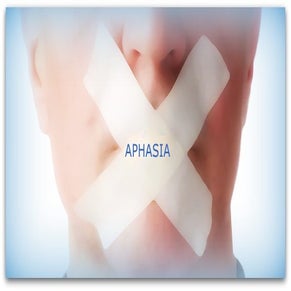
WHAT IS APHASIA ?
Aphasia is a disturbance of the comprehension and expression of language caused by dysfunction in the brain. Aphasia is a language disorder (a = not, phasia = speaking) Aphasia is not a speech disorder.
Aphasia occurs when you know what to say but you are unable to put it in writing or find it difficult to speak. For people with aphasia this is a daily reality. One cannot say what he wants to say. There is a problem with understanding and producing language. People cannot reach their language, cannot use the words in their language or do not understand the language so well.
Note...! Aphasia does not affect intelligence! Because people with aphasia have difficulty communicating, others often mistakenly assume they are mentally ill or have mental retardation, but the person's intelligence is basically intact.
Aphasia may make it difficult to:
- Speak
- Understand spoken language
- Read
- Write
- Use numbers and do calculations
- Use non-verbal gesturing
©ILLUSTRATION Carolina Firenza and James Newbary
WHEN DO YOU GET APHASIA ?
Aphasia usually occurs after a hemorrhage in the left hemisphere, because in 90% of mankind this is where the language area is situated. Strokes that damage the frontal and parietal lobes in the right hemisphere of the brain can cause a person to have difficulty expressing and processing language. Acute aphasia disorders usually develop quickly as a result of head injury or stroke, and progressive forms of aphasia develop slowly from a brain tumor, infection, or dementia.
The terms Broca's aphasia (difficulty with speaking and language) and Wernicke's Aphasia (impaired language comprehension in listening and reading) are used less often than before, because there is a mixed picture; global aphasia.

Damage to Broca's region of the brain
Patients with this disorder have problems with spontaneous speech as well as with the repetition of words or phrases.
The speech is often jerky. They also have difficulty understanding grammatical aspects of language: also called agrammatism (the inability to speak in a grammatically correct fashion). People with agrammatism may have telegraphic speech.
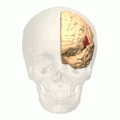 Broca's area
Broca's area
This is evident not only in language expression, but also the understanding of sentences. For example, the phrase "the boy ate the cookie" is less problematic than the more complex sentence "the boy was kicked by the girl".
The second sentence is more difficult. If the patient is asked to repeat this sentence, he will probably say, "boy kicks girl".
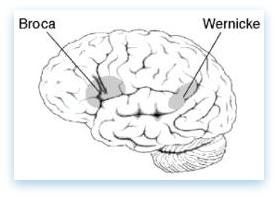
The region of the brain that plays a role in understanding language is named after the discoverer Carl Wernicke.
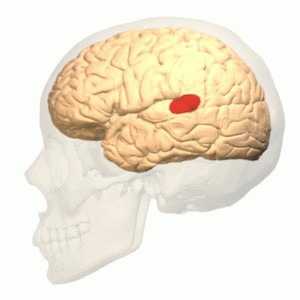 Wernicke's area
Wernicke's area
It is also called the sensory speech center and is the opposite of the motor speech center: the center of Broca.
Disease or damage in Wernicke's region can lead to dyslexia and sensory aphasia.
The spoken language of wernicke patients usually sounds smooth, but lacks meaning. The Wernicke's area is usually in the left temporal lobe of the brains.
APHASIA TYPES
Aphasia types include expressive aphasia, receptive aphasia, conduction aphasia, anomic aphasia, global aphasia, primary progressive aphasias and many others.
Aphasia is different for everyone. The severity and extent of aphasia depend on the location and severity of the brain injury, the former language ability and one's personality.
Some people with aphasia can understand language but have trouble finding the right words or the right construction of sentences.
Some people with aphasia confuse letters of a word.
Others speak a lot, but what they say is difficult to understand; these people often have great difficulty understanding language themselves.
The language ability of most people with aphasia is somewhere in between these two extremes. Note that a person with aphasia generally still has full intellectual capacities!
A full recovery from aphasia is possible, but if symptoms persist long enough, usually more than six months, then a complete recovery becomes unlikely.
IS THERE ANY THERAPY?
- Speech therapy is the most common treatment for aphasia. Other types of therapy have also proven effective for some stroke survivors, including:
- Melodic intonation therapy sometimes allows stroke survivors to sing words they cannot speak. Also called Speech Music Therapy Aphasia/ SMTA
- Art therapy
- Visual speech perception therapy focuses on associating pictures with words.
- Constraint-induced language therapy involves creating a scenario in which spoken verbal communication is the only available option, and other types of communication, such as visual cues from body language, are not possible.
- Group therapy and support groups
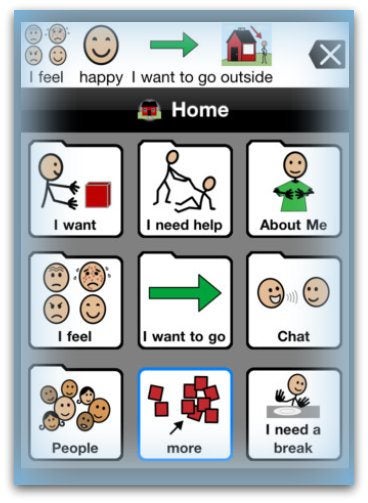
WHAT IS APRAXIA (OF SPEECH)?
Apraxia is a disorder of the motor planning of the brain. This kind of disorder is caused by damage that occurs in the cerebrum. Aphasia is caused by wounds on the left hemisphere of the brain. This is one of the main differences between Aphasia and Apraxia. In Apraxia the speech muscles are working properly but the problem is how to control these muscles of mouth and tongue. It's not always the same words or sounds that gives problems. The person with verbal apraxia struggles to pronounce the wordt correctly.
See video below. from the 38' second
|
|
||
|
Join topic expert Melissa Denker, MS, CCC-SLP, for the webinar Aphasia and Stroke and learn more about the following topics: |
||
|
||
|
Melissa Denker is a speech language pathologist at Cheyenne Regional Medical Center in Cheyenne, Wyoming. |
||
|
If you have aphasia Use props to make conversation easier (photos, maps). Draw or write things down on paper. Stay calm. Take one idea at a time. Show people what works best for you. Take your time. Make phone calls or try talking only when you have plenty of time. Create a communication book that includes words, pictures and symbols that are helpful. Use the Internet to connect to people via email or to create a personal webpage. Carry and show others a card or paper explaining what aphasia is and that you have it. Keep it in your purse or wallet. |
VIDEOS
Understood?
Research has shown that people with aphasia in general, regardless of severity or nature of aphasia, have difficulty understanding spoken language.
At best, someone needs more time to understand.
"Frequently it happens that one assumes that the person with aphasia has understood everything, while in reality, perhaps only half is understood." says Jenny Palm neuropsychologist and author of several books on brain injury.
Resources: Aphasia Association Netherlands, UMCG Center for Rehabilitation Speech Therapy, Coping with brain-Palm, MT Banich (2004). Cognitive Neuroscience and Neuropsychology. 2nd edition. Houghton Mifflin Cie and J.B.M. Kuks, J. W. Pike, H.J.G.H. Oosterhuis. Clinical Neurology 15th Edition, Bohn Stafleu Of Loghum, Wood, 2003, ISBN 90-313-4028-6 National Aphasia Association, NIH / National Institute of Neurological Disorders and Stroke ,Natinal Stroke Association America Ihope center
National Stroke Association
American Heart Association
American Speech Language Hearing Association
American Stroke Association
Aphasia Help
Aphasia Hope Foundation
Aphasia NYC
Aphasia Solutions Network
Brain Attack Coalition
National Aphasia Association
National Aphasia Association Hotline: 1-800-922-4622
National Institute on Deafness and Other Communicative Disorders
National Institute of Neurological Disorders and Stroke
Stroke Awareness for Everyone
Stroke Survivor
Stroke Survivor Connection
The Stroke Network
Talkback Association for Aphasia Inc
Speech-Language-Therapy.com
AARP
http://www.aphasia.org/content/aphasia-faq
http://www.differencebetween.com/difference-between-aphasia-and-vs-dysarthria/

